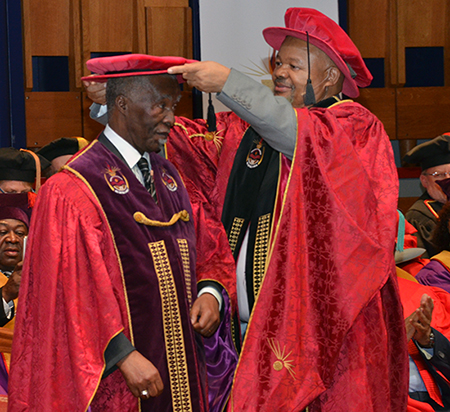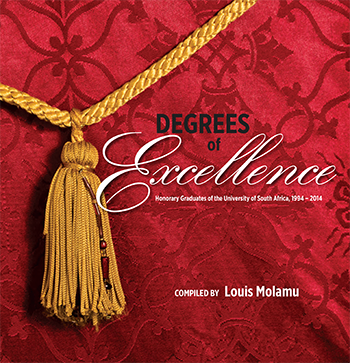
“As Africans we have a shared responsibility to strive continuously, whatever the challenges, to achieve the renaissance of Africa.”

Prof Mandla Makhanya (Principal and Vice-Chancellor: Unisa) (left) caps former president Thabo Mbeki as the new Chancellor of Unisa.
Former President Thabo Mbeki was delivering his maiden address as Chancellor of Unisa after his inauguration on 27 February 2017 at the ZK Matthews Great Hall.
“The African universities, including Unisa, have a special responsibility to strive to occupy the front trenches in terms of producing the ideas and knowledge, cadres, and activists who will drive Africa’s effort to realise that renaissance,” the new chancellor said.
Mbeki emphasised that renaissance meant eradicating the legacy of centuries, and perhaps a millennium, of a demeaning European perception of Africa and Africans, as well as the stubborn material and subjective consequences of slavery, imperialism, colonialism and neo-colonialism.
“The eradication of that legacy necessarily means the corollary possibility to construct something new, such that as Africans we define ourselves according to our image of ourselves, exercising our inalienable right to self-determination.”
The new chancellor concluded that it was exactly in that context that the Unisa vision—Towards the African university in the service of humanity—assumed particular importance.
Sakhi Simelane, Chairperson of the Unisa Council, described the occasion as seminal moment that would undoubtedly occupy a prominent place in the history books of the institution. “This inauguration of his excellency Thabo Mbeki as Chancellor of Unisa represents a turning point in history, marked by the convergence of great minds, statures, track records, intellectual prowess, and mutual commitment to the rebirth of Africa,” he said to loud cheers.
Simelane said Mbeki is a towering figure who brings a wealth of experience as an influential intellectual, policy maker, and leading mediator who beat the drum of peace across the continent.
“In Thabo Mbeki, Unisa could not have asked for a more qualified, more committed and dedicated and more suitable and iconic potent symbol in driving the Africa agenda,” he affirmed.
Simelane was not the only one to sing Mbeki’s praises. Dr Blade Nzimande, Minister of Higher Education and Training, echoed the same sentiment, describing the former statesman as a giant intellectual who is amongst the best the continent ever produced.
“I want to say without fear of contradiction that you are one of the greatest intellectuals produced by our movement; not only by our movement but our country and our continent,” he said to loud approval in the hall.
Nzimande said Mbeki is a blessing to the nation, and Unisa must take advantage of its association with him. He urged the former president to be involved in tackling some of the challenges that have recently plunged the higher education sector into chaos, and which saw students up in arms demanding free education and a decolonised curriculum.
The minister also acknowledged that Unisa is a big role player in the higher education sector and that all universities owe their roots to Unisa, which established them as colleges. He added that 35% of students across South Africa study with Unisa, and he would like to see the university emerge as the champion of transformation.
Prof Mandla Makhanya, Principal and Vice-Chancellor of Unisa, said the installation of Mbeki as the new chancellor would give the university more impetus and Unisa would face the future with the conviction that its bold vision of being the African university shaping futures in the service of humanity would be achieved.
“The installation of a chancellor always marks a new era in the life of a university. I therefore ask you to engage as constructively as possible in our mission, because if Unisa is to be properly transformed for a new era under President Mbeki’s chancellorship, we have to work together. We have to find common solutions and we need to locate ourselves in African ideas, philosophies, and contexts,” he said.
The occasion also served as the opening of the 2017 academic year, providing a platform to highlight Unisa’s achievements and set the agenda for the year. The event also recognised members of staff for their academic achievements.
The Vice-Chancellor lamented that South African higher education had been beset by a wave of protests that had rocked its foundations on a scale that had not been experienced since the advent of our democratic dispensation. He said the demands by students for a free education, dramatic transformation, and social justice were a major cause of unrest in the higher education sector.
He added that calls for free education and transformation had created spaces for constructive engagement to define the futures.
He shared with the university community some of the major achievements underscored in 2016. He said in spite of some of the achievements, plans and strategies, the university continued to grapple with many challenges, which required a new approach.
“We need an urgent overhaul of our institutional culture to promote inclusivity and ethical governance. Perhaps most importantly in the present crisis of higher education, we must face head-on the challenge of student funding and the allocation of financial resources within the university,” he concluded.
Simalane praised the management for steering Unisa in a right direction amidst the turbulent challenges. He said the issue of access and success remain critical challenge, which must be acknowledged. He said a lot more needs to be done to support first year students.
 “As far as education is concerned, the simple truth is that, of course we need to increase access…but our success and throughput rates must grow in tandem with the growing numbers of students entering university. I know that Unisa has many professors and I would like to see them not just in the research journals but also applying their wisdom to the teaching of first year students. That’s where we need to begin.”
“As far as education is concerned, the simple truth is that, of course we need to increase access…but our success and throughput rates must grow in tandem with the growing numbers of students entering university. I know that Unisa has many professors and I would like to see them not just in the research journals but also applying their wisdom to the teaching of first year students. That’s where we need to begin.”
The event also saw the launch of a Unisa publication titled Degrees of excellence—Honorary graduates of the University of South Africa, 1994–2014. The book profiles outstanding South African, continental, and global figures who have received honorary degrees from the university for the profound contribution they have made in society and on humanity.
Compiled by a former Registrar, Professor Louis Molamu, the book captures the spirit of Unisa as ‘a university of the people’ across boundaries of race, class, gender, creed and nationality, fully committed to social justice as well as intellectual excellence. It also reminds us that the social obligations that accompany rights become even more important in times of transformation. Universities dare not remain aloof when inequality persists and knowledge is lodged in colonial archives.
For more information, photographs and videos of the event, visit the Inauguration website.
*By Percy Mthombeni
Publish date: 2017-03-01 00:00:00.0